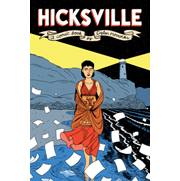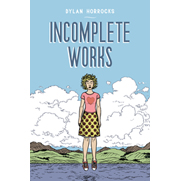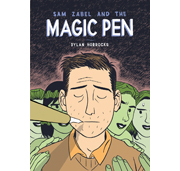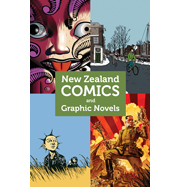Just when you thought the internet couldn’t get any better, you stumble across Rock Cookie Bottom. This guy (Jonathan Mann) writes a song a day, and puts ’em online (complete with music video) for us to enjoy. They’re smart, hilarious, and topical. My personal favourites (from the last week alone!) include:
and his second economics-related follow-up hit:
Go visit Rock Cookie Bottom now and improve your day considerably.

















Dylan – the “Copying Isn’t Theft” song (and you recent polemic strip on Section 92A) prompts me to ask you – what is your actual position on intellectual property rights? I ask this because I’m hoping your position isn’t as naive as that in the song. For instance- If I were to find a full scan of “Hicksville” on the internet and read it for free in this format rather than buy myself a physical copy, would that constitute a moral wronghood for you?
No, it wouldn’t. Any more than you borrowing a friend’s copy or taking it out of the library. Reading something for free is not a moral wrong.
I actually don’t think the song is as naive as it seems. It only makes one small point, but it’s one well worth introducing into the debate: “theft” IS the wrong word for filesharing and digital copying. And there’s a clear moral difference between stealing and creating free copies, which I think the song makes very clear.
Stealing a copy of Hicksville from the public library would be a moral wrong, because it deprives other people of the opportunity to read it. Also, if someone else published it and made a heap of money from it – without my permission – that would be wrong, because it’s exploiting my labour to make a profit. And if some corporation claimed ownership over the characters in the story and threatened to sue me if I tried to do new comics about them – obviously that would be very wrong indeed (cf. Siegel & Schuster being screwed by DC Comics).
But suing someone for freely sharing Hicksville online? In my opinion, that too would be morally wrong.
I don’t want my income to depend on ruthlessly preventing access to my work. The idea that everyone who ever reads Hicksville should have to pay me some money for the privilege is abhorrent to me. Instead, I prefer to make my work as widely available as possible. In the past, the only practical way to do that was via printed copies (which cost money to produce). So it made sense to charge money for that; it was simply the most effective way to get one’s work out there. These days, however, that’s no longer true.
Every so often, new technology comes along that removes the underlying constraints and conditions on which the economics of the arts were built, as well as providing new opportunities for creation and distribution: printing, photographic reproduction, recording, broadcasting, photocopying, etc.
Of course, this causes turmoil. Printing wasn’t exactly a godsend to scribes; photography was a catastrophe for engravers; recording was resisted by musicians, sheet music publishers and player piano manufacturers. Every time this happens, there are people who feel their livelihood depends on those old constraints, and they fight to keep them in place.
So, naturally, the internet is being fought by those who’ve built a huge structure of controlled reproduction and distribution of records, movies and books. They are the ‘middlemen’ without whom the old art economy couldn’t effectively operate – but now they see their whole raison d’etre disappearing, and naturally, they’re scared. IMHO, the whole fetishisation (and expansion) of so-called “intellectual property rights” in recent years has been primarily an expression of that fear (channeled into self-righteous anger).
But here’s the thing: as things change, new economies emerge – out of the innovative practises of producers and consumers.* And right now artists are exploring all kinds of new ways to get their work out there, and – of course – to earn a living. These new economies are being formed by a different set of conditions and constraints, opportunities and demands – and so they’re taking on a very different shape.
One key difference I see is that, for a lot of people, paying for access to content no longer makes sense. The reality (harsh or liberating, depending on your perspective) is that if you can get something for free from The Pirate Bay or Mininova or your best mate’s hard drive, why the hell should you have to pay for it?
According to people like Jack Valenti (may he rest in peace), there’s no way a business can compete with “free.” But the way I see it, there are plenty of successful businesses which do exactly that. Why do people buy bottled water when they can get it for free from the kitchen tap? Why do people go to a swimming pool when there are beaches nearby? Why do people go to a concert by their favourite band when they already own the same songs on CD? The answer (partly) is “added value.” People are happy to pay for something unique, or more convenient, or more pleasurable than the free alternatives (e.g. the excitement of being at a real life concert, the cool water slides they have at that particular swimming pool, etc).
So as an artist, I realise there’s no point in fighting filesharing, and the growing trend towards freely available content. Before long, I suspect, it will seem absurd to charge people for something unless it’s an actual physical object – a printed book, a t-shirt, a piece of original art – or a unique and unreproducable experience.
But think what we’re gaining! We now live in an era when it’s technologically feasible for anyone anywhere in the world to be able to experience almost any work of literature, music, or art – regardless of their location or wealth. And those same people can now share their ideas and creations with everyone else – no matter who or where they are.
That seems like a pretty good trade off to me…
By the way, you may notice that everything on this site is under a ‘creative commons – by attribution, non-commercial’ license. That means people are welcome to copy it so long as they give me credit, and don’t make money from it.
I hope that answers your question. 😉
*I don’t want to come over all ‘free market’ here. On the contrary, I think the state has a big role to play in regulating markets to minimise economic exploitation and prevent injustices and inequalities. But in doing so, private property rights need to be balanced with the public good. It’s not helpful when those regulations are primarily shaped by the demands of large media corporations (as with s92), rather than serving the interests of individual artists and consumers. Let’s face it; copyright law has been used just as often to screw artists as to protect them. Especially in the comics business…
Wow – sorry; you asked a concise question and I answered with a manifesto. Ahem…
I just can’t shut up, can I?
No, no! It’s all very interesting, and I was probably a little too antagonistic in my intial comment, after all. While I tend to accept that the traditional model is outmoded, I tend to take a pessimistic attitude towards the more avid proponents of file sharing and free copyright, and the quasi-messianic idoltary of the internet that underlies it (lord, already a cumudgeon at 22…). I don’t view it as a transition from a inferior to a superior system, just an exchange of one system with particular virtues and flaws to another system with different virtues and flaws.